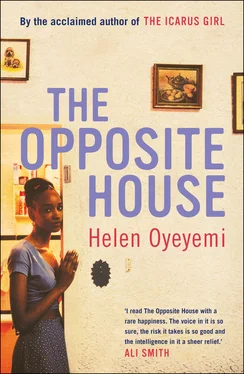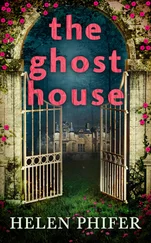Helen Oyeyemi - The Opposite House
Здесь есть возможность читать онлайн «Helen Oyeyemi - The Opposite House» весь текст электронной книги совершенно бесплатно (целиком полную версию без сокращений). В некоторых случаях можно слушать аудио, скачать через торрент в формате fb2 и присутствует краткое содержание. Год выпуска: 2008, Издательство: Bloomsbury UK, Жанр: Современная проза, на английском языке. Описание произведения, (предисловие) а так же отзывы посетителей доступны на портале библиотеки ЛибКат.
- Название:The Opposite House
- Автор:
- Издательство:Bloomsbury UK
- Жанр:
- Год:2008
- ISBN:нет данных
- Рейтинг книги:4 / 5. Голосов: 1
-
Избранное:Добавить в избранное
- Отзывы:
-
Ваша оценка:
- 80
- 1
- 2
- 3
- 4
- 5
The Opposite House: краткое содержание, описание и аннотация
Предлагаем к чтению аннотацию, описание, краткое содержание или предисловие (зависит от того, что написал сам автор книги «The Opposite House»). Если вы не нашли необходимую информацию о книге — напишите в комментариях, мы постараемся отыскать её.
The Opposite House — читать онлайн бесплатно полную книгу (весь текст) целиком
Ниже представлен текст книги, разбитый по страницам. Система сохранения места последней прочитанной страницы, позволяет с удобством читать онлайн бесплатно книгу «The Opposite House», без необходимости каждый раз заново искать на чём Вы остановились. Поставьте закладку, и сможете в любой момент перейти на страницу, на которой закончили чтение.
Интервал:
Закладка:
For my part, I puffed out smoke spirals and said in sly reference, ‘Damned Cypriots. Dark as sin, what. Wrong colour, aren’t they? Taking our jobs and marrying our gentlemen. They didn’t fight any of our battles, what.’ It was 1987 — in Poplar, people were still calling out things like ‘Soap dodger!’ in the streets.
‘Are you hungry?’ I ask Papi. I have brought some leftovers in plastic tubs, and I point to the bag of them at my feet, but Papi shakes his head.
‘I could cook something else,’ I tell him, standing. With a simple touch to my forearm, Papi brings me back down beside him.
‘So she’s really serious about this altar,’ he says.
‘Pero por supuesto — but of course, Papi.’
‘Because you know how you Cuban women can be sometimes. Dramáticas, siempre el drama.’ He gingerly flexes his hands, examines his inflamed finger joints.
I say, ‘No, she’s. . it’s real.’
‘But I need to think about this. If I have that thing moved back here, it is like saying that it’s OK that she is going to consult with these people, these poor, ill people who are looking for something that has meaning and don’t know what it is they’re looking for and call it Santeria. As for my wife being one of them, it makes me think, What is it that she wants that I haven’t given her?’
Papi wouldn’t be asking me this if I were Tomás. I am slow to reply because if I am to be Mami’s voice in this argument I need to think of what she’d say, and I don’t know.
Papi shifts the cigar to the other side of his mouth and says, ‘Santeria is a garbled religion. So it draws on Catholicism, and it draws on Yoruba religion. It’s like throwing a rosary in the air and saying it’s magic because it fell from a slave’s hand. Suffering isn’t transformative.’
I say, ‘True, but that doesn’t mean that suffering can’t be religious.’
He doesn’t hear me.
‘I mean, Maja, these gods or whatever, these beliefs don’t transcend time and space; they stretch them unnecessarily, stretch the geography of the world like an elastic band. And you can’t do that. You can’t erase borders and stride over Spanish into Yoruba like that. You can only pretend that you have.’
I would hate to be in a lecture of his and ask him a question. He just doesn’t hear you. He closes his eyes, sucks in smoke, streams it out, just breathes and breathes. The Holy Child of Atocha is looking him full in the face; the aguardiente has evaporated from its dish. The Holy Child of Atocha is staring at Papi and Papi does not care.
‘I’m going to bring the altar back downstairs,’ I tell him. ‘And then we can fix whatever parts of it are broken.’
Papi reaches for his ashtray, knocks ash off his Cohiba without opening his eyes.
‘Papi?’
‘Yes, Maja, let’s do that,’ he says finally, in quiet, good-humoured obedience. As I go upstairs, he calls, ‘Please bring some air freshener down.’
I stop in the doorway of Tomás’s bedroom, unwilling to test the borders of his wild order of Cuban flags and Union Jacks and WWF relics. They jostle with collaged images of Rogue and Wolverine from Marvel’s X-Men.
Tomás has a teddy bear now; it sits on his pillow, by his head. The bear has one club foot and one normal foot. He is a production line reject; his fur is too black, as dark as despair must be. The bear’s name is Henry S. Foote. Amy Eleni found him in a charity shop last month. A few days before her discovery, she, Tomás and I had watched a TV programme about the US Civil War.
The presenter mentioned, very briefly, a Mississippi senator called Henry S. Foote who got so het up about the question of the South’s secession from the North that, right in the middle of the Congress building, he threatened the Congressman next to him with a loaded revolver. The presenter was just talking about how feelings were running high in the mid nineteenth century, and Henry S. Foote only came up for a second, Henry S. Foote was only an example he was using. But because of Tomás, we ended up talking about Henry S. Foote for the rest of the programme.
Tomás was upset by him. He kept saying, ‘What was Henry S. Foote carrying that gun around for?’
I said, ‘Maybe he just really wanted to keep his slaves or whatever.’
Amy Eleni offered the opinion that politics were different in those days. Or that Henry S. Foote was toying with the idea of killing himself. I suggested that Henry S. Foote had gout and was irritable. Together Amy Eleni and I proffered a theory that Henry S. Foote suffered from undiagnosed paranoid schizophrenia and had this compulsion to protect himself with terminal intensity. Or that Henry S. Foote was so rabidly anti-abolition because he had black ancestors and was terrified that someone might find out.
Tomás didn’t accept anything we said. He said, No, Henry S. Foote was fucked up. Chabella popped out of nowhere and nearly chewed Tomás’s ear off about his language. Then, while clothes shopping, Amy Eleni saw the bear. She brought the ugly thing over to the house, pointed at the club foot and raised her eyebrows at Tomás, who immediately remembered and said, ‘Henry S. Foote.’ Then they both nodded, as if something was confirmed.
Tubes of face paint form a deliberate circle on Tomás’s dresser. His paintbrushes are gelled stiff and white.
Next door is my old room, where Mami’s altar stands concertinaed on unsteady legs against my wardrobe. I touch the altar and rickety bells ring from somewhere inside. My room is exactly the same as it was when I was still at university; completely and obsessively black and white. Mami has not allowed any changes, and she has not allowed any of Tomás’s friends to sleep in my bed for fear of bad luck. The black ceiling was laboriously painted, with Amy Eleni’s unquestioning help, over a long weekend. The floorboards are white, but the rug is black and so are the bedcovers. The wardrobe is white, the bookshelves are white, and every book on them is covered in black paper and laminate.
I did all of this at the end of my first year of an English Literature degree, when note-taking had worn me down and I realised how I hated books and would kill the spirit of all novels if that power was mine. I believed that God must and would in his mercy kill me rather than let me survive the summer and start the next term. I didn’t think about switching courses; I didn’t want to. Papi is not so badly wrong when he says of Cuban women, ‘Siempre el drama.’
Papi and Tomás were at the library when I took out a pot of black paint and started for my bedroom windows. But Mami had been lurking and watching me and had decided, Not in my house. She ran into the room to wrestle me for the paint pot, shouting, ‘Loca, tu estás loca!’
At the foot of the altar, Papi has set down debris removed from his and Mami’s bedroom — a framed picture of the Holy Child of Atocha, smaller than the one on the sitting-room wall, and Mami’s silk-lined, gold-painted incense box. I open the box to make sure that her Santería beads — devotional chains in Elegua’s colours — are still there; they lie intact at the bottom of the case, beneath a bed of folded rice-paper flowers. The collar is a rope of heavy black and red, strands of beads coiled like a sated snake. I close the box and catch Brigitte’s photo in the act of fluttering from altar to floor, return it to its place beside the photo of my Bisabuela.
Brigitte, expert escapee. Brigitte got out of East Germany, got out of Cuba, left Chabella behind. Brigitte is a white-gold blaze, and it’s not just that the photo of her was developed badly. Her platinum-blonde bob flicks over her face and half hides her sharp smile. A brown hand is on Brigitte’s shoulder, but Chabella has cut the rest of herself out of that picture because it is the only one that she has of Brigitte. Mami remembers that maybe it was a problem with her Spanish, or maybe it was the thin drama of her red-lipsticked mouth, but Brigitte spoke and smiled with a great deal of tension. She measured out her murmur as if she didn’t have much time to say what she needed to say, but understood the importance of clarity. When she said, ‘Please. . I need some more soap,’ it was an event.
Читать дальшеИнтервал:
Закладка:
Похожие книги на «The Opposite House»
Представляем Вашему вниманию похожие книги на «The Opposite House» списком для выбора. Мы отобрали схожую по названию и смыслу литературу в надежде предоставить читателям больше вариантов отыскать новые, интересные, ещё непрочитанные произведения.
Обсуждение, отзывы о книге «The Opposite House» и просто собственные мнения читателей. Оставьте ваши комментарии, напишите, что Вы думаете о произведении, его смысле или главных героях. Укажите что конкретно понравилось, а что нет, и почему Вы так считаете.












